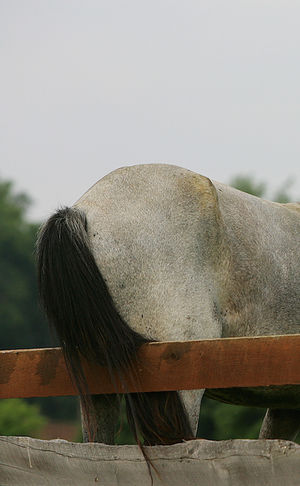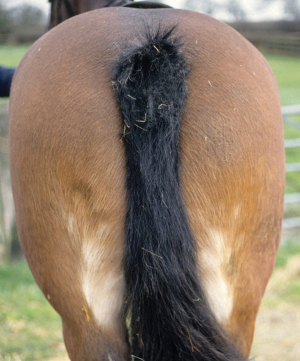Pinworms have the most efficient life cycle of all the parasites that infect the horse. They don't migrate through any organ tissue, and they have developed a means of reproduction by which the eggs don't leave the herd of horses.
While the horse is relaxed or sleeping, female pinworms crawl out of the horse's rectum, deposit eggs and a sticky substance on the perianal region of the horse, and crawl back into the rectum. Infective pinworm eggs are ingested orally and, once in the colon, the larvae develop through various stages before becoming sexually mature in about five months. As horses migrate, they take the eggs and adults with them.
Anal Irritation From Pinworms
Fortunately, about the only damage that pinworms cause is itching of the tail head. This annoys the horse but doesn't threaten its life. Because pinworms spend their entire lives in the lumen of the intestine and don't migrate, they cause very little physical damage to the horse. Horses can have massive pinworm infections without exhibiting significant health problems.
What To Look For
 Keep an eye out for skin irritation around the anus area, rubbing of the tail, as well as biting and licking of hindquarters. In some situations, changes in behavior such as nervousness and loss of appetite may occur. Due to their life cycle, fecal tests are not a reliable method for detecting pinworm infestation. Veterinarians sometimes use the “scotch tape test”. This method uses tape that is pressed on the anal area and is then examined under a microscope.
Keep an eye out for skin irritation around the anus area, rubbing of the tail, as well as biting and licking of hindquarters. In some situations, changes in behavior such as nervousness and loss of appetite may occur. Due to their life cycle, fecal tests are not a reliable method for detecting pinworm infestation. Veterinarians sometimes use the “scotch tape test”. This method uses tape that is pressed on the anal area and is then examined under a microscope.
The typical infected horse will go in search of places to rub their bottom in an effort to relieve the itching. When a horse scratches itself, residue from this sticky sub- stance can be left on surfaces. The larvae can also drop into the paddock or stable floor. Because of these circum- stances, horses are vulnerable to becoming infected and/or re-infected for up to four (4) months.
What to do?
Pinworm infestations are not easy to get rid of. Good stable management practice is needed, in addition to the proper dewormer.
For your horse - thoroughly cleanse the anus/tail and other affected areas before ad- ministering an appropriate dewormer.
For the stable - disinfect grooming kits, water and feed buckets, as well as other items the horse has rubbed on or come into contact with.

